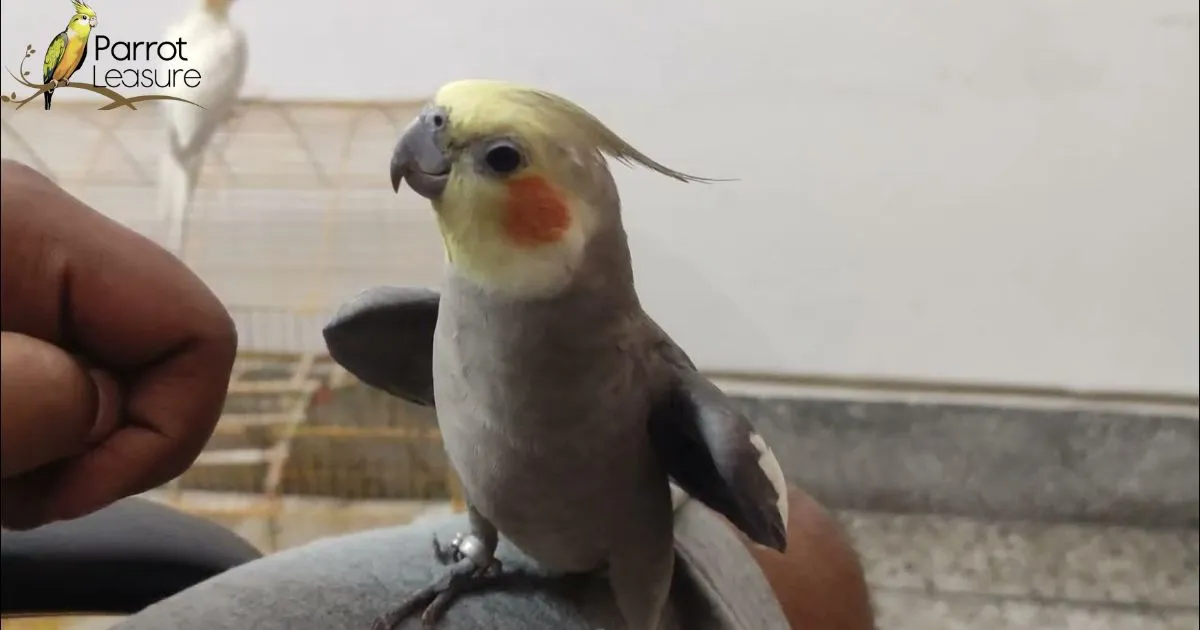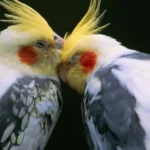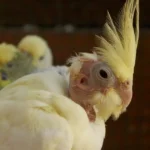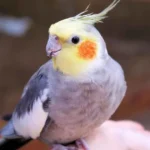Cockatiel hissing is a defensive behavior displayed by these pet birds. It involves making a sharp, breathy sound while opening their beaks. This action serves as a warning signal to potential threats.
Have you ever wondered why your feathered friend suddenly starts making strange noises? Cockatiels have a unique way of communicating their emotions, and hissing is one of them. If you’ve encountered this behavior, you probably ask yourself, Why Do Cockatiels Hiss? Don’t worry, we’re here to unravel this mystery for you.
Cockatiel hissing can convey various messages depending on the situation. It may indicate fear, discomfort, or a desire to be left alone. Sometimes, it signifies territorial behavior or a response to sudden changes.
Understanding Cockatiel Communication
Cockatiels communicate through various vocalizations and body language. They use chirps, whistles, and hisses to express their emotions and needs. Body postures, feather positions, and eye expressions also play crucial roles. Understanding these cues helps owners better care for their pets.
Hissing is a key part of cockatiel communication, often signaling discomfort or fear. It’s typically accompanied by a defensive stance and raised crest feathers. Recognizing these signals allows owners to address their bird’s concerns. Proper interpretation of cockatiel communication fosters a stronger bond between pet and owner.
The Cockatiel Hiss: A Defense Mechanism
Cockatiels use hissing as a primary defense mechanism. This behavior is instinctive and serves to ward off potential threats. When a cockatiel hisses, it’s expressing discomfort or fear. The hiss is often accompanied by other defensive postures.
These postures may include flattening feathers or raising wings. Hissing is typically a warning before more aggressive actions. It’s the cockatiel’s way of saying “back off” to perceived threats. Understanding this behavior helps owners respond appropriately to their pet’s needs.
Common Triggers for Cockatiel Hissing

Cockatiels may hiss when they feel threatened by unfamiliar people or animals. Sudden movements or loud noises can also trigger this defensive behavior. Changes in their environment, such as new cage placement, can cause stress and hissing. Introducing new toys or perches may temporarily provoke this reaction.
Handling a cockatiel roughly or against its will often leads to hissing. Lack of sleep or disrupted routines can make them more prone to this behavior. Territorial instincts during the breeding season may increase hissing. Health issues or pain can also cause cockatiels to hiss more frequently.
Cockatiel’s Body Language and Hissing
Cockatiels use body language alongside hissing to communicate. They may puff up their feathers, raise their crest, and open their beak wide when hissing. These birds might also spread their wings or tail feathers to appear larger. Such displays often indicate the cockatiel feels threatened or defensive.
Observing your cockatiel’s posture can help interpret their hissing. A relaxed bird with a slightly raised crest might hiss playfully. However, a flattened crest with pinned eyes usually signals fear or aggression. Understanding these cues helps you respond appropriately to your pet’s needs.
Related To This Post: How Do Cockatiels Sleep?
Differentiating Cockatiel Hisses from Other Sounds
Cockatiels produce various sounds, including hisses, chirps, and whistles. Hisses are distinct, sharp, and breathy noises made with an open beak. They differ from cheerful chirps or melodious whistles in tone and purpose. Hisses are typically short and abrupt, unlike longer vocalizations.
Cockatiel hisses often accompany defensive body language. This may include raised crest feathers and a rigid posture. In contrast, happy sounds are usually paired with relaxed body language. Understanding these differences helps owners interpret their pet’s mood and needs accurately.
Responding to a Hissing Cockatiel

When your cockatiel hisses, remain calm and avoid sudden movements. Give your bird space and time to relax. Speak softly and reassuringly to help ease their anxiety. Identify and remove the source of stress if possible.
Never punish your cockatiel for hissing. Instead, offer treats when they display calm behavior. Gradually reintroduce yourself or the stressor using positive reinforcement. Patience and consistency are key to building trust with a hissing cockatiel.
Cockatiel Stress and Its Relation to Hissing
Cockatiels may hiss when stressed, indicating discomfort or fear. Common stressors include loud noises, new environments, and unfamiliar people or animals. Changes in routine, lack of sleep, or inadequate nutrition can also trigger stress. Hissing serves as a warning sign, telling others to back off.
Recognizing stress-related hissing is crucial for cockatiel care. Observe your bird’s body language and surroundings to identify potential stressors. Providing a calm environment, a consistent routine, and a proper diet can help reduce stress. If hissing persists, consult an avian veterinarian to rule out health issues.
Training Your Cockatiel to Reduce Hissing
Training your cockatiel to reduce hissing requires patience and consistency. Start by identifying the triggers that cause your bird to hiss. Gradually expose your cockatiel to these triggers in a controlled, positive environment. Reward calm behavior with treats and praise to reinforce good habits.
Use positive reinforcement techniques to build trust with your cockatiel. Avoid punishing or scolding your bird for hissing, as this can increase stress. Instead, focus on creating a comfortable and secure environment. With time and gentle training, most cockatiels can learn to feel more relaxed and hiss less frequently.
Health Issues That May Cause Cockatiel Hissing
Cockatiels may hiss due to underlying health problems. Pain from injuries or infections can cause irritability and hissing. Respiratory issues like air sac mites or aspergillosis can make breathing difficult. This discomfort might lead to increased hissing as a sign of distress.
Hormonal imbalances during the breeding season can also trigger hissing. Nutritional deficiencies may cause mood changes and unusual behaviors. Tumors or neurological issues could alter a cockatiel’s temperament. If hissing suddenly increases, consult an avian veterinarian for a proper diagnosis.
Creating a Hiss-Free Environment for Your Cockatiel
Creating a calm environment is crucial for a happy cockatiel. Start by providing a spacious cage with plenty of toys and perches. Keep the cage in a quiet area away from sudden noises or movements. Maintain a consistent routine for feeding, cleaning, and playtime.
Introduce new items or changes gradually to avoid startling your bird. Ensure proper lighting and temperature in the room. Offer a varied diet and fresh water daily. Spend time bonding with your cockatiel through gentle interactions and positive reinforcement. These steps will help reduce stress and minimize hissing behavior.
When to Seek Professional Help for Cockatiel Behavior
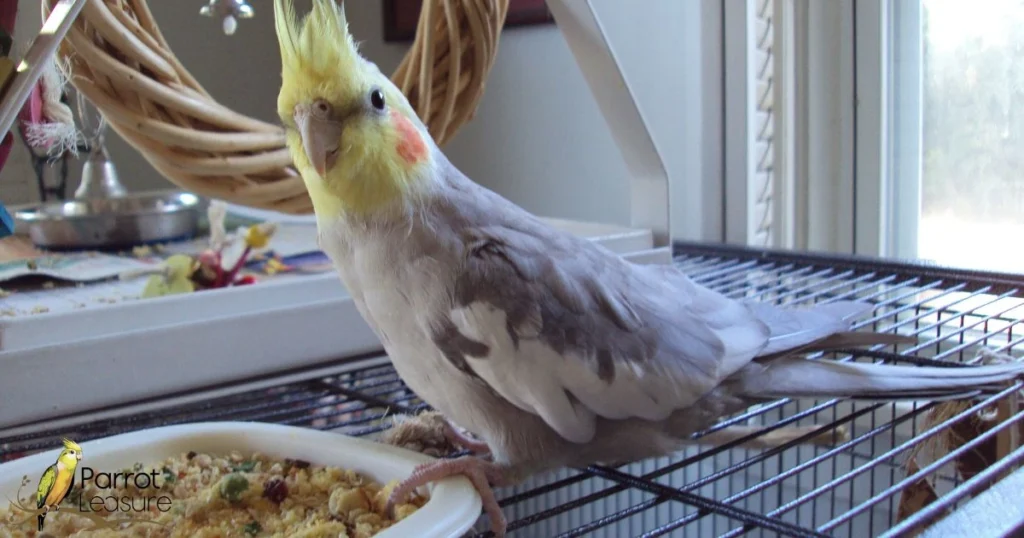
Sometimes cockatiel behavior can be concerning. Persistent aggression, excessive hissing, or sudden changes in temperament may indicate underlying issues. If your bird shows prolonged stress or fear, it’s time to consult an avian veterinarian. Unusual physical symptoms alongside behavioral changes also warrant professional attention.
Experts can identify health problems or environmental stressors affecting your cockatiel. They may recommend dietary adjustments, environmental modifications, or specific training techniques. In some cases, medication or specialized treatment might be necessary. Professional help ensures your cockatiel’s well-being and improves your relationship with your feathered friend.
FAQ’s
How do I stop a cockatiel hissing at me?
It’d be best to forget cuddling for now. Your bird doesn’t trust you yet and the last thing he needs is to have his personal space so invaded on.
How do you know if a cockatiel is angry?
If the cockatiel’s eyes suddenly dilate, that could be a sign he’s getting mad. Stop what you’re doing if you see this warning sign.
Why does my cockatiel hiss and try to bite me?
A cockatiel can bite when it is trying to sleep and you disturb it, when it needs to go to the bathroom, or when feeling protective and trying to warn you about a real or perceived danger.
Can a cockatiel love its owner?
They recognize their caretakers and are responsive to their voices. They are fairly easy to care for. Cockatiels are ideal starter birds for novice pet owners.
Can cockatiels get jealous?
It can also be very stressful for the female when you handle the male. If you keep the birds in separate cages, allowing some interaction outside of the cage, the birds typically will not bond.
Final Thoughts
Cockatiel hissing is a natural behavior with various causes. It can stem from fear, stress, territorial instincts, or discomfort. Understanding your bird’s body language and addressing its needs can help reduce hissing. With patience and proper care, you can create a harmonious environment for your feathered companion.
